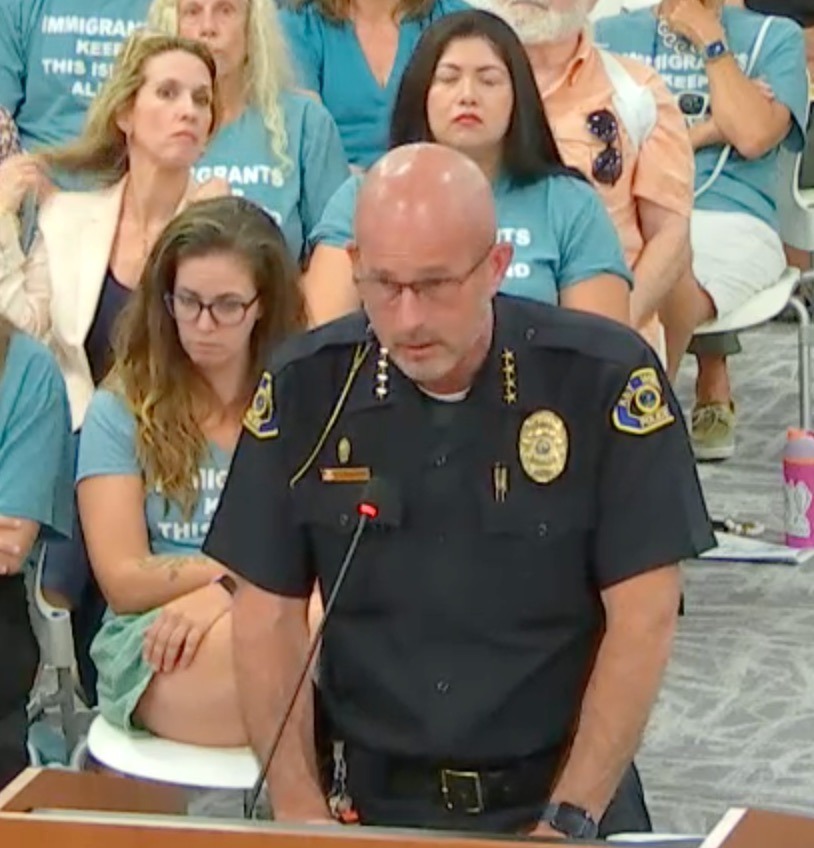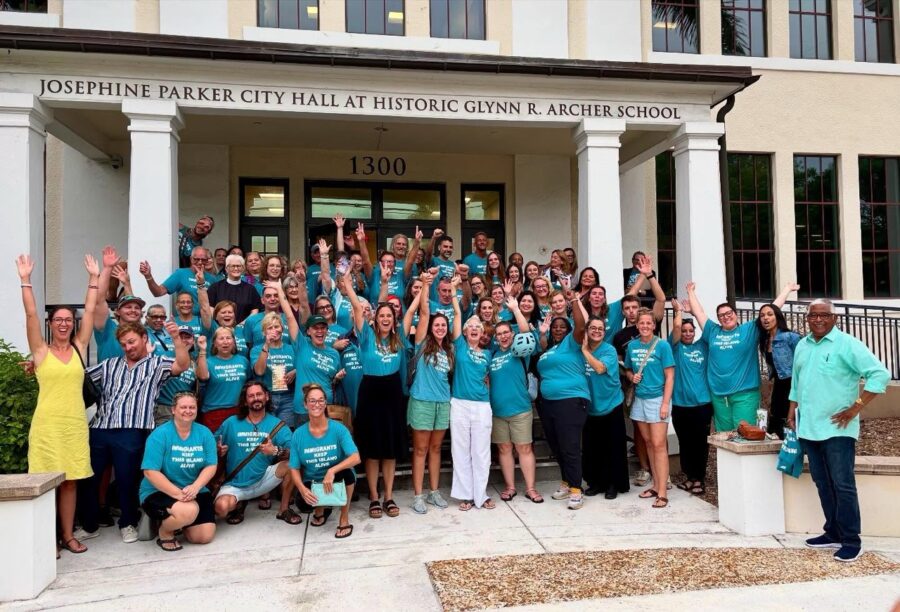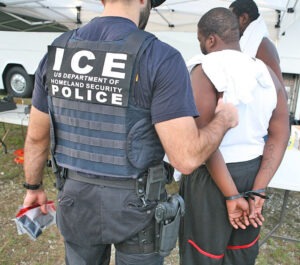
The Key West community spoke and its leaders listened, voting on June 30 to void the city’s agreement with the federal Immigration & Customs Enforcement (ICE) agency that would have trained and deputized local police officers to enforce immigration law.
Two days later, the city received the threatening letter it expected from Florida Attorney General James Uthmeier.
Residents packed city hall for a June 30 special meeting of the city commission, with some having to sit on the floor. Dozens of members of the Key West Immigrant Support Network wore blue T-shirts that declared, “Immigrants keep this island alive.”
Nearly 30 attendees spoke passionately on behalf of Key West’s immigrant community while urging city officials not to be bullied by the governor and Florida attorney general, who have insisted that cooperative agreements with ICE, known as 287(g) agreements, are mandatory for local police chiefs and departments. Uthmeier and Gov. Ron DeSantis have said that police chiefs and city officials who refuse to comply will be removed from office.
The 287(g) agreements require local police departments to partner with ICE and participate in enhanced immigration enforcement efforts that have seen dozens of working immigrant residents with varying documentation status, stopped in Key West for alleged bicycle traffic infractions, detained and taken away to the detention center in Krome.
After two hours of emotional public input, the Key West commission voted 6-1 to void the 287(g) agreement that Key West Police Chief Sean Brandenburg signed in March, having been told the governor could remove him from office if he refused.
“I was certainly in no rush to get involved, but it had been made abundantly clear to me that signing a 287(g) agreement was mandatory for Florida police chiefs,” Brandenburg told the crowd. “If you as a governing body want to challenge the state and the law, please follow the city of South Miami’s lead and challenge it as a commission.”

So that’s what Key West voted to do, giving credit to the mayor and police chief of South Miami, who were the first to reject a 287(g) agreement, and thus the first to feel the ire of Florida Attorney General James Uthmeier, who threatened to remove the officials from office if they did not comply. But South Miami did not back down, and many Key West residents are hoping their city commissioners show the same fortitude.
Speaking at the June 30 meeting, five or six local attorneys assured city lawmakers that the law was on their side with regard to the 287(g) agreements. While county sheriffs are required to enter the cooperative partnerships, municipal police chiefs are not, they said.
“The legal obligation does not exist,” attorney Ashley Sybesma told the commission. “What’s being applied now is political pressure.”
She added that 287(g) agreements shifts liability from federal ICE agents to city police officers.
“There is no federal reimbursement for funds expended and no indemnity if one of our officers gets sued. How does it serve the people of Key West to take on federal responsibilities and redirect our local resources? I urge this community to be brave and step away from this agreement to ensure our local resources and local officers will not be outsourced to ICE,” Sybesma added.
Dozens of other speakers urged the commissioners to stand up to what they called federal and state overreach.
“History isn’t kind to those who say. ‘We had no choice,’” one speaker said. “If we only resist when it’s safe to do so, we are complicit. This act isn’t just about policy, it’s about the soul of this island. You may not be able to stop ICE, but you can stop helping them. Be the ones who tried.”
Krystal Thomas told the commissioners, “You know right from wrong. This is wrong. We deserve leaders who protect the vulnerable and oppose overreach.”
Chris Massicotte said, “This is a remarkably safe community, due in large part to the professionalism and compassion of the Key West Police Department and the leadership of Chief Sean Brandenburg. That’s why we’re deeply concerned that the 287(g) agreement sends the wrong message to our immigrant neighbors that they can’t trust local law enforcement. Immigrants are essential to Key West. They keep entire industries afloat and deserve to feel safe without fear of a traffic stop. We didn’t create this situation but we are living with the consequences.”
Commission voids ICE agreement
In the end, the city commission voted to void the agreement, taking its cues from South Miami, which has faced the ire of DeSantis and Uthmeier, but has thus far held its own on legal grounds in refusing to sign an agreement.
Commissioner Lissette Carey cast the only vote in support of the city’s 287(g) agreement.
Commissioners Monica Haskell, who sponsored the resolution to end the ICE agreement, along with Donie Lee, Sam Kaufman and Aaron Castillo told those in attendance that they had been moved by the statements offered by residents at the meeting. Two speakers reminded the commissioners that the Conch Republic had been created in 1982 because Key West stood up and opposed federal overreach.
It was a sentiment that resonated with Lee, a former Key West police chief, who acknowledged that he hadn’t initially planned to vote to void the ICE agreement that night.
“I came here tonight with a gun to my head, preparing to vote against this resolution,” Lee said. “And I think the chief signed the agreement with a gun to his head under threat. But I can’t as a commissioner sit up here and repeatedly support resolutions affirming the Conch Republic and then vote against this tonight.
“It was federal overreach back then and it’s federal and state overreach now,” Lee said. “Decisions made from my heart tend to get me in trouble. I just hope this decision from my heart doesn’t get the city in trouble.”

And then came the state’s response
Florida Attorney General James Uthmeier responded to Key West’s rebellion within hours of the commission’s vote, posting on social media, “The city of Key West will be hearing from my office very soon.”
The letter from Uthmeier took a day longer than expected to arrive, as the attorney general spent July 1 in the Everglades, where DeSantis and President Donald Trump were touring the new, so-called Alligator Alcatraz immigrant detention center, and touting the lethality of the alligators that surround the facility that was assembled from trailers in less than a week.
Uthmeier sent a letter to the city on July 2, stating, in part, “On June 30, 2025, the Key West City Commission voted to void the City of Key West Police Department’s 287(g) agreement with the United States Immigration and Customs Enforcement (“ICE”). In doing so, you directly violated Florida Law. …
“By declaring the department’s existing 287(g) agreement void, Key West has made itself a sanctuary city. Prohibiting its police officers from receiving the necessary federal training to adequately enforce U.S. immigration laws not only prevents city police from enforcing current federal immigration law but also effectively prevents the city police department from participating in federal immigration operations. In this instance, however, it’s even worse.
“The commission didn’t merely prevent the police department from entering a 287(g) agreement; it affirmatively voided an existing 287(g) agreement under which the Police Department was actively operating. Bad policy, and illegal.”
“…The City Commission must immediately reverse its June 30, 2025, action and allow the Police Department to resume cooperative engagement with ICE under its 287(g) agreement. Failure to take corrective action will result in the enforcement of all applicable civil and criminal penalties, including removal from office by the governor pursuant to sec- tion 908.107, Florida Statutes, and the Florida Constitution.”
City officials had fully expected such a letter, but as of July 3 had not finalized a reply. As part of its vote on June 30, the city is poised to follow the lead of the city of South Miami in its legal arguments.
South Miami has filed a lawsuit against DeSantis and Uthmeier, stating in part, “Governor DeSantis and Attorney General Uthmeier have taken the position that a municipality’s entry into such a 287(g) agreement is mandated by Chapter 908, Florida Statutes.
“Specifically, Attorney General Uthmeier has taken the position that a municipality’s failure to approve such an agreement constitutes the adoption of an unlawful ‘sanctuary policy,’ subjecting the municipality and individual municipal officers to enforcement action pursuant to section 908.107, Florida Statutes.
“Governor DeSantis and Attorney General Uthmeier have in fact threatened to use their enforcement powers against municipalities and municipal officers in an effort to coerce municipalities into executing 287(g) agreements.
“Under the city’s reading of Chapter 908, the city is not required by law to enter into a 287(g) agreement, for several reasons.
“Among other things, section 908.11, Florida Statutes, specifically requires ‘the sheriff or the chief correctional officer operating a county detention facility’ to enter into a 287(g) Agreement, … i.e., the provision requiring only county officers to enter into such agreements.
“By contrast, the Legislature chose not to include any such requirement for municipalities to enter into a 287(g) agreement. Chapter 908 contains no express requirement that municipalities enter into 287(g) agreements; and the definition of “sanctuary policy” makes no reference to 287(g) agreements except as expressly limited to the county requirement. Therefore, the plain text of the statute does not support the governor and attorney general’s expansive reading of the controlling statutes.”


















